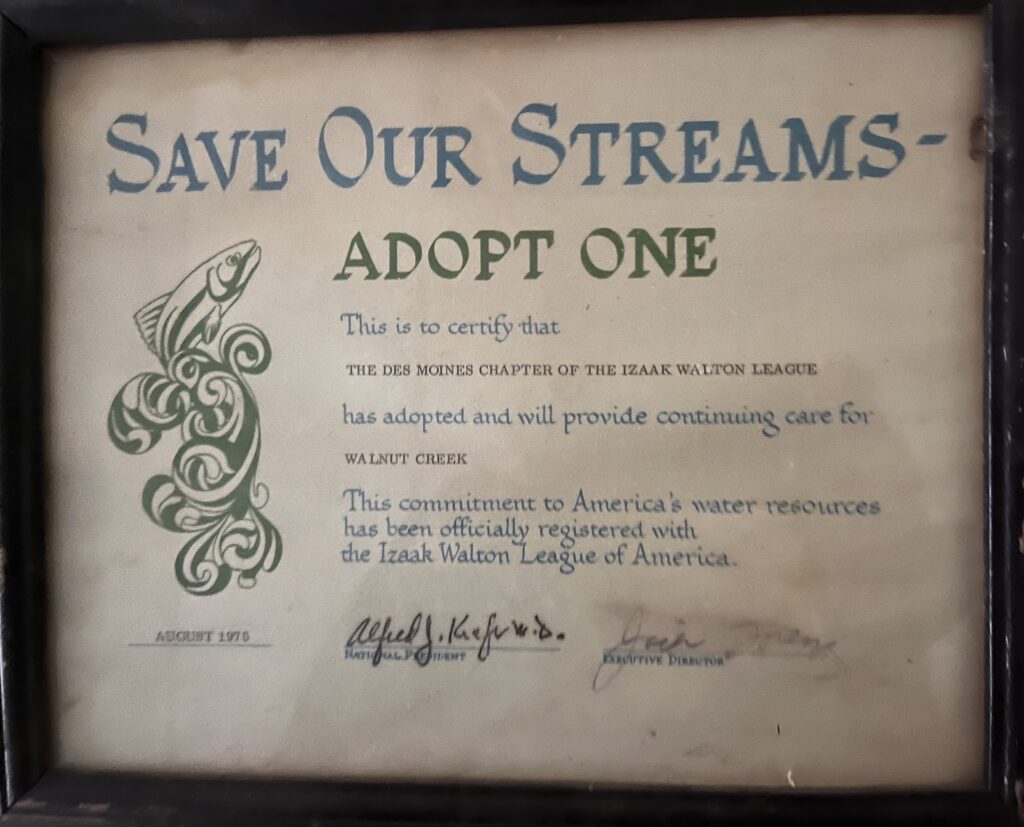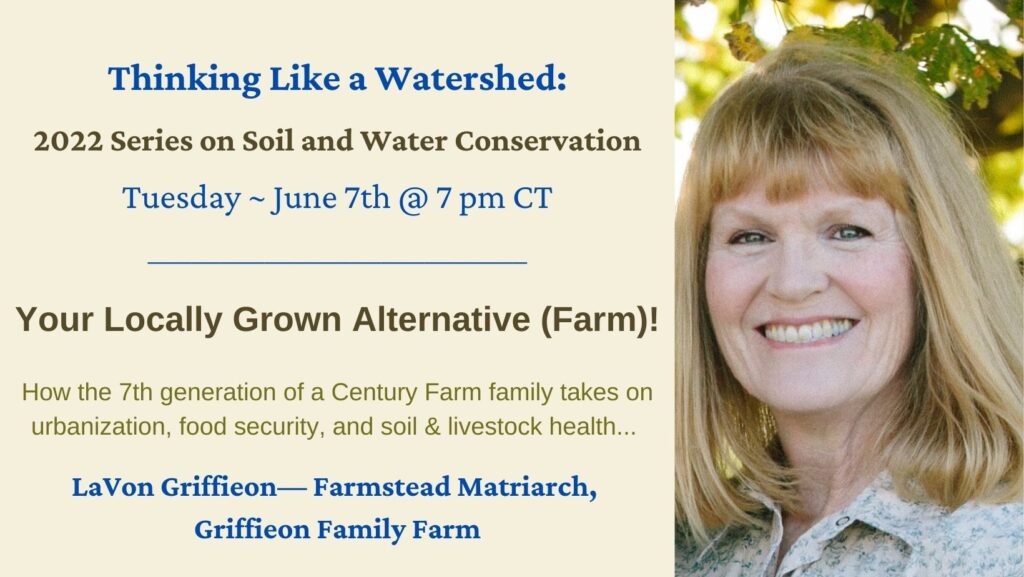
“The golden dome reflects the last light of at the end of the day” December 2022, Photo by: Robin Fortney
“This is where state legislators have power to protect our natural resources or not. As citizens, we must make sure to vote for representatives that will advocate to protect our soil, air, woods, waters and wildlife for public health, recreation and long-term economic stability.” says IWL’s Iowa Conservation Director, Mike Delaney.
Once again— We are grateful that the Izaak Walton League provides UMRI a home within a respected organization and leaders that give credibility to our undertaking of addressing problems of climate change, compromised natural resources; polluted waters, destruction of habitats, flooding, sedimentation and food production. Most of the individuals and organizations who are committed and take action are volunteers who give hours of their time to the cause of improving our natural capital to create a harmonious life for all. We are Thankful for ALL of you!
Thinking Like a Watershed in 2023—
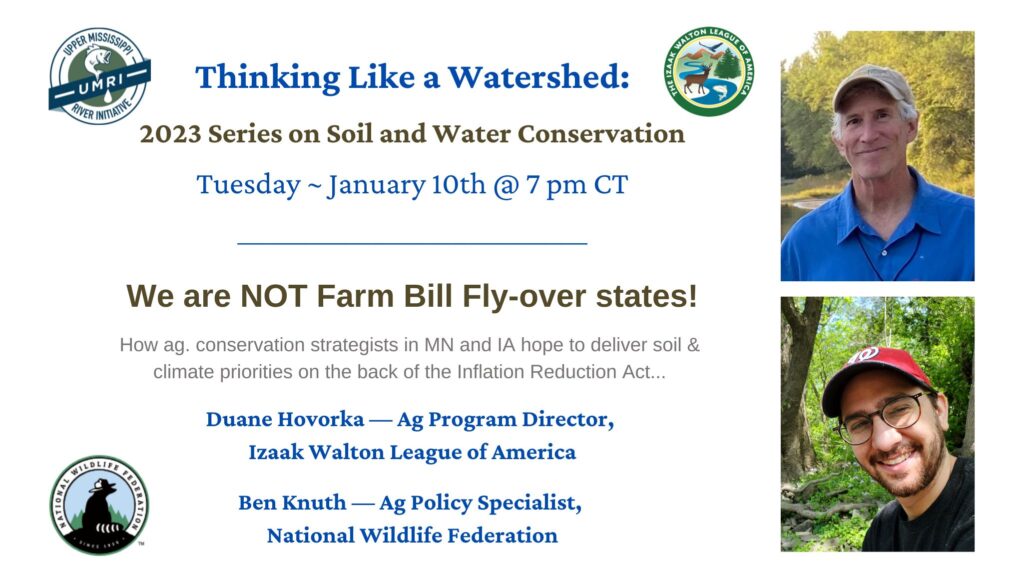
Join us! via Zoom Tuesday, January 10th @ 7 pm…
“We are NOT Farm Bill Fly-over states!”
How ag. conservation strategists in MN and IA hope to deliver soil and climate priorities on the back of the Inflation Reduction Act. A preview of what’s next, with Duane Hovorka, Agriculture Program Director, Izaak Walton League of America, and Ben Knuth, Agriculture Policy Specialist, National Wildlife Federation.
Please share this event with your networks! Facebook link!
The 5-year design of a new federal Farm Bill received a re-set last fall when Congress authorized the climate-forward Inflation Reduction Act. With those separate funds and a new Congress in mind, ag. conservationists in Minnesota and Iowa met in early January to pool priorities and strategies. Led by the Izaak Walton League and the National Wildlife Foundation, participants sorted out results of last year’s listening sessions – how best to make good on non-operating landowner demands, on the need for meat processors, for an update to soil erosion formulas, for insurance incentives for soil health practices, for doubling conservation dollars for programs known to better water, soil, wildlife, and climate needs?
The January gathering asked for perspectives and then took time to meld priorities of 2 states determined not to be fly-over fodder. Join the IWLA’s agriculture program director, Duane Hovorka, and NWF’s agriculture policy specialist, Ben Knuth, for what was decided and how they will go forward.
This monthly series is a project of the Upper Mississippi River Initiative of the Izaak Walton League of America, with co-hosts Chris Henning of the Panora Conservation Chapter and Des Moines Chapter Communication Director, Bud Hartley. We feature guests for 30-40 minute presentations that shed daylight on good works done in the name of the Mississippi and its uplands. In this way we uplift our shared goals for a cleaner river, a cared for environment, and kinder communities. Recorded programs are available at umri.org shortly after they air live.
2022 Reflections—
—Awards and celebrations throughout the year: IWL’s 100th year anniversary events; the DSM Chapter’s Centennial’s celebration; Farmer’s Appreciation Night, DSM Chapter, where we feature farmers in our networks who are incorporating conservation practices to improve soil health, water quality and their production.
—Successful grant match during our valentine’s LOVE MATCH campaign, where $10,000 was raised.
—2023 Farm Bill inputs, listening sessions, and several explorations with Izaak Walton League’s Agriculture Director, Duane Hovorka
—UMRI’s Thinking Like a Watershed 2022 program…where we shared stories of watershed heroes and heroines
—SOS (Save Our Streams) activities https://www.iwla.org/water/stream-monitoring demonstrations and continued support for the Raccoon River/Save Squirrel Hollow, Save Bloody Run and other streams with the DSM Chapter, Panora Conservation Chapter, and Polk County Conservation
—IWL endowment grant was secured with Panora Conservation Chapter for outreach and monitoring of the Raccoon River, Save Squirrel Hollow in Greene County
—Minnesota and Iowa river boundary explorations and drainage discussions continued with the Des Moines River and Cedar River Water monitoring
—Panora Conservation Chapter’s Prairie Restoration School Project at Panora Middle School in Guthrie County continues
—Engagement and discussions regarding natural resources with several of Iowa legislators and Panora Conservation Chapter members
—November Spark Iowa Conference and Banquet in collaboration with Panora Conservation Chapter and other dedicated conservationists…where we continued to showcase the Soul. Soil. Spark. vision and strategy for the future of Iowa.
—During this past year we have shared many great stories and images via our UMRI monthly website features under “Iowa Conservation Efforts”
It’s wonderful to go back through some of the 2022 links and observe the contributions that were made:
Continuing in 2023—
— Continue to build on establishing SOS teams throughout Iowa with additional SOS trainers and sites, public education and build awareness through citizen science outreach events.
—Continue to collaborate with Minnesota UMRI and other IWL colleagues with “Thinking Like a Watershed” 2023 virtual Zoom program.
—Establish additional Non-operating landowner in person and/or virtual series in partnership with UMRI Minnesota colleagues
—Continue to build on improving natural resources with water quality and soil health initiatives and projects with partners in our watershed counties, communities. Continue to engage and have conversations with our Iowa legislators.
—Feature the stories great works of farmers, conservationists and environmental advocates in our watershed networks and continue to help amplify their voices…creating a better world for all.
Farm Sweet Farm—
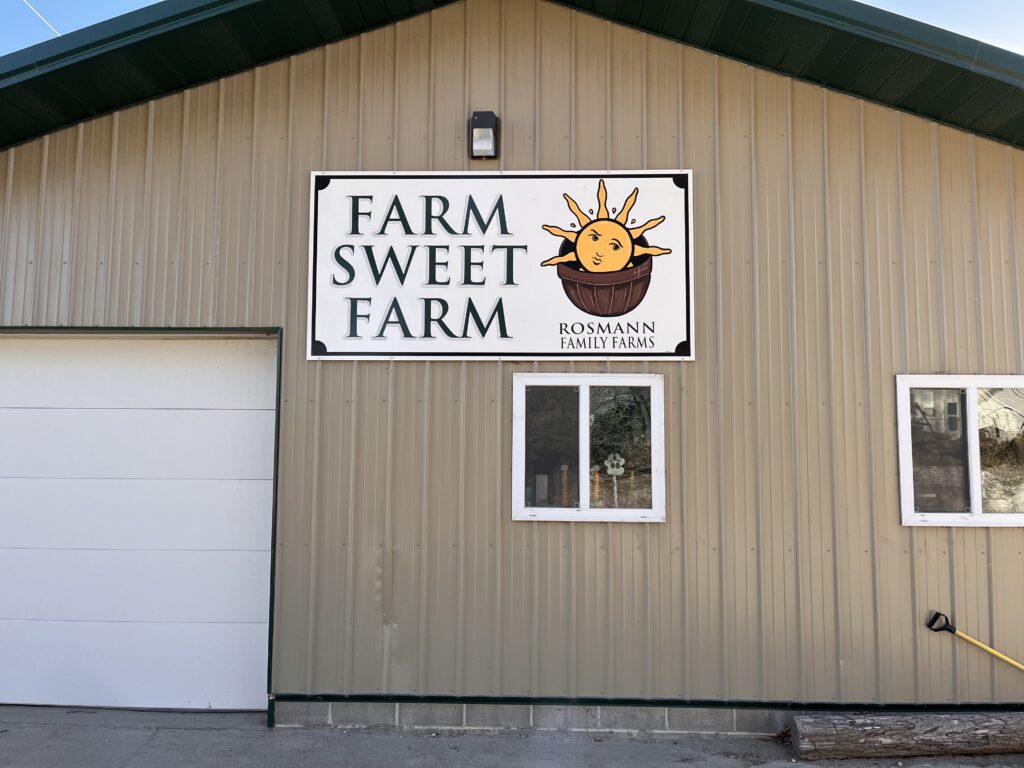
Rosmann’s Family farm store “Farm Sweet Farm”, Photo by: Christine Curry
December included a visit to one of Iowa’s best organic family farms. The Rosmann’s family farm is located in Shelby County. Ron and Maria have created a beautiful family farm business, check out their Farm Sweet Farm website to learn more. Better yet, visit their Farm Sweet Farm store. All of the food grown on the farm is sold right on site, including organic popcorn! While you’re in the area, you must make a stop in the beautiful Harlan town square and have breakfast or lunch at their family’s farm to table Milk and Honey cafe. Almost everything on the menu has been grown on Rosmann’s farm.
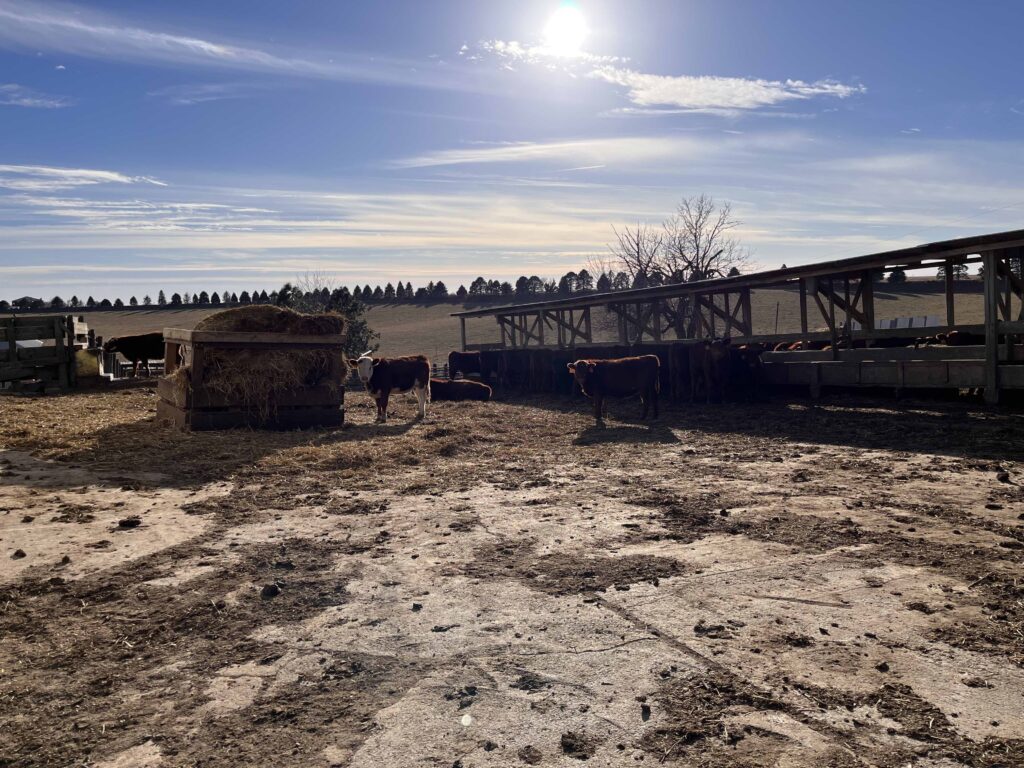
Rosmann’s farm cattle outside! December 2022, Photo by: Christine Curry
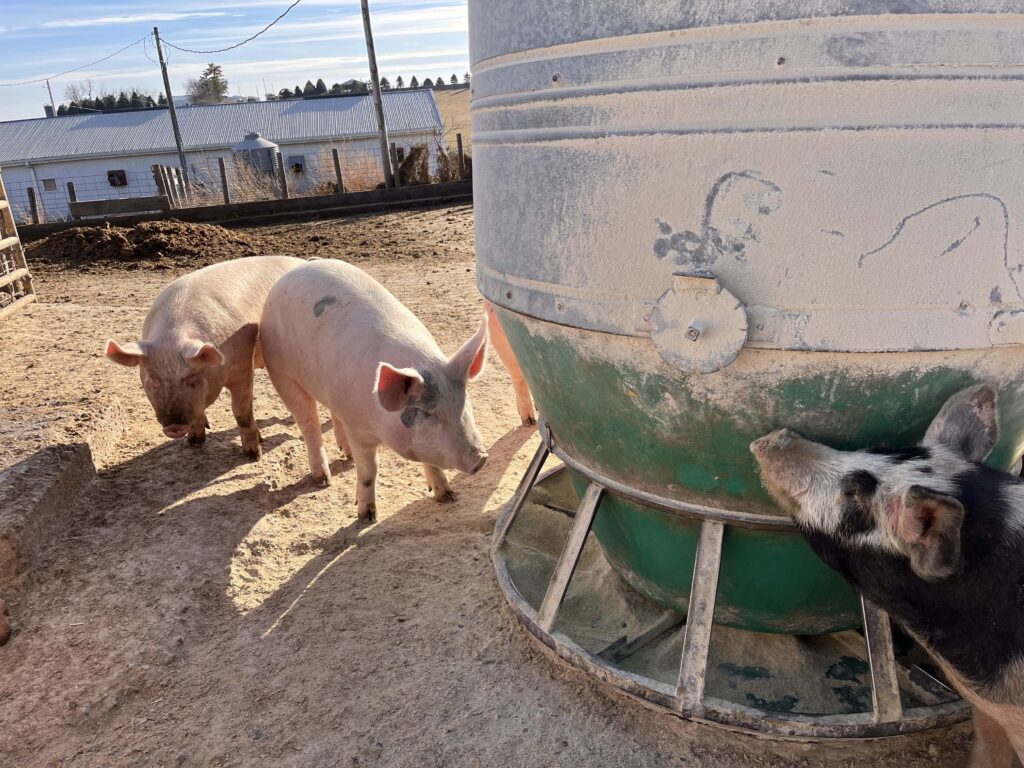
Rosmann’s farm pigs outside! December 2022, Photo by: Christine Curry
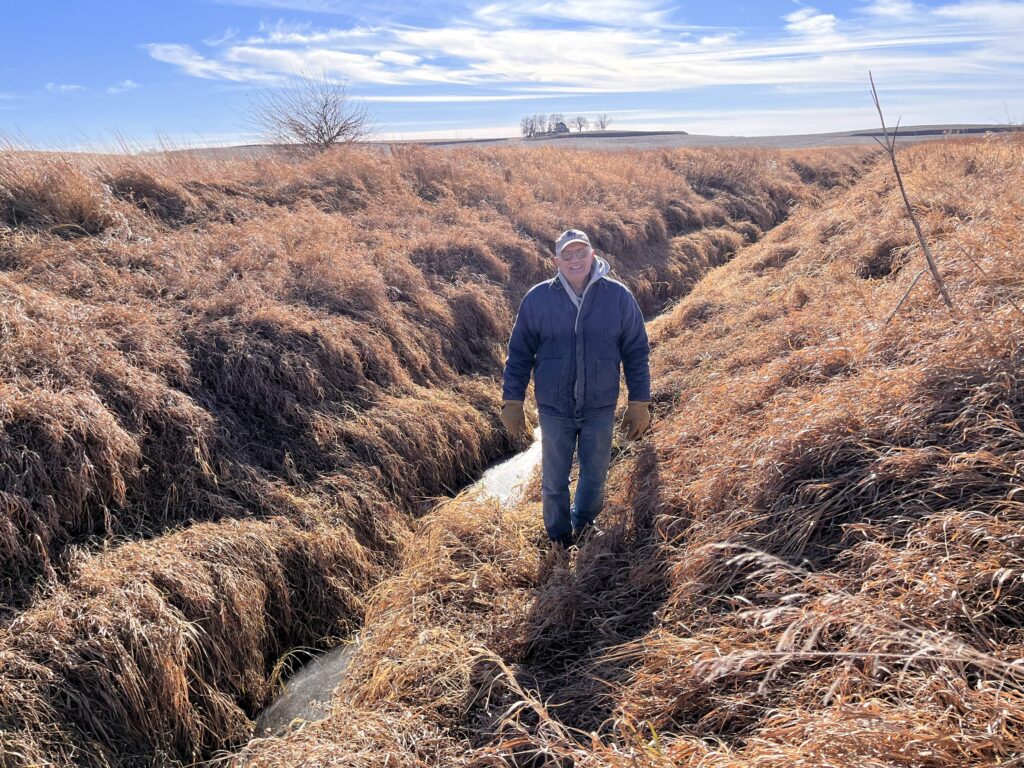
Ron standing next to Keg Creek south of Rosmann’s farm. December 2022, Photo by: Christine Curry
Keg Creek runs through the Rosmann farm. Ron is interested in learning more about the water quality that runs off their farm tiles into the creek. So during our farm visit we tested the water in the creek. It was a very cold day and much of the creek was frozen. The most challenging part of testing was to locate a patch of flowing water to monitor.
The Rosmann’s conservation practices contribute to healthy soil and clean water. Most conservation farmers want to know that their practices are helping to increase soil health and clean our waterways.
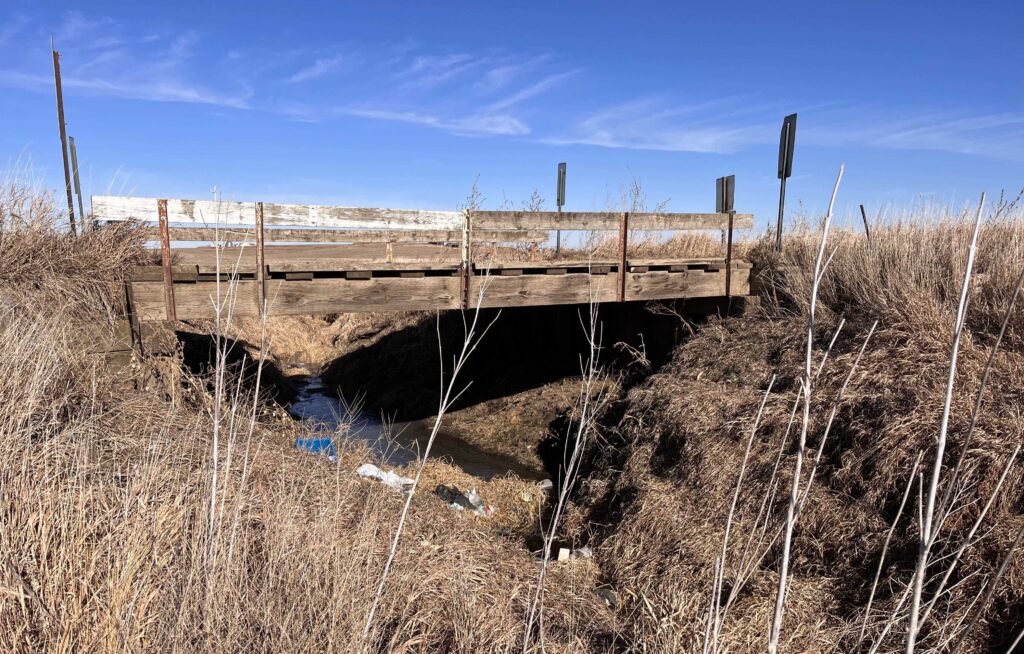
Keg Creek Bridge. December 2022, Photo by: Christine Curry
As we followed the stream further south from their farm, we crossed a bridge located near one of Ron’s cousin’s farm. At the bridge we noticed that someone decided to dump trash over the bridge. We were beyond sad and devastated that anyone would throw their trash in the creek. There are harmful things in streams that you can and can not see. We must defend nature and save our streams!
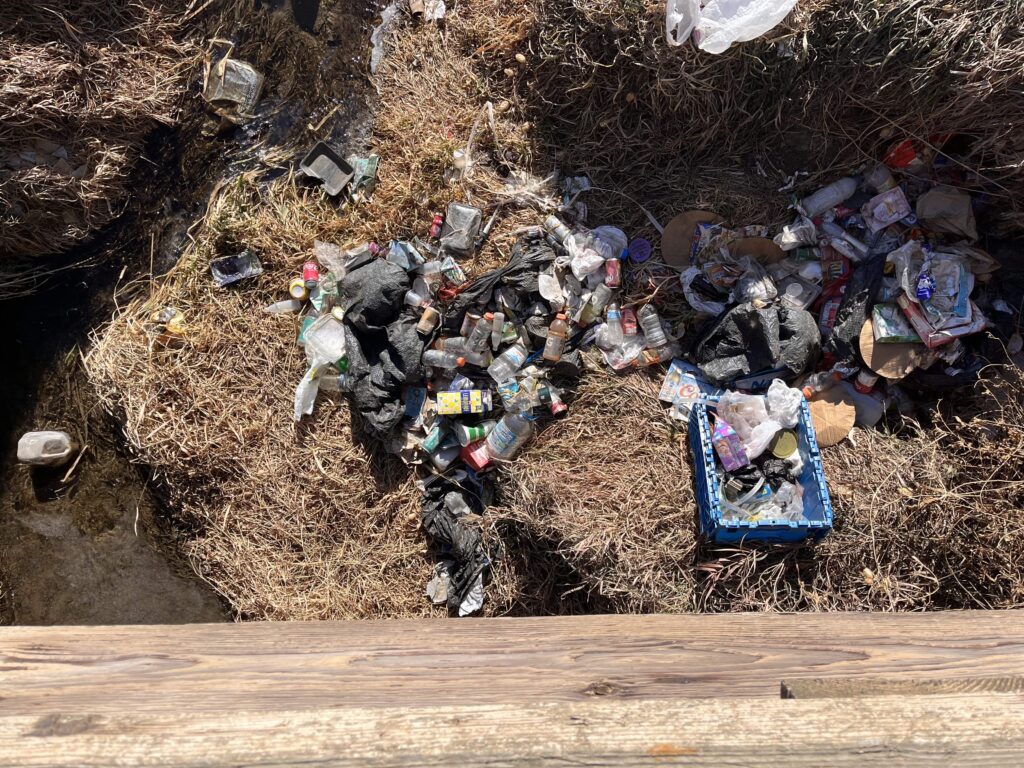
Trash dumped over bridge into Keg Creek, Shelby County. December 2022, Photo by: Christine Curry
We are hopeful that 2023 will be filled with advocates defending our nation’s soil, air, woods, waters and wildlife.
We’re inspired by this…
PEOPLE TO WATCH IN 2023
The dirt on cover crops
Sarah Carlson encourages farmers get paid for adopting conservation practices to reduce erosion
Ronna Faaborg and Donnelle Eller Des Moines Register | USA TODAY NETWORK December 28, 2022
Sarah Carlson has been called the Johnny Appleseed of cover crops. Hearing that comparison makes her smile and say, “I’ll take that.” In her role as senior programs and member engagement director at Practical Farmers of Iowa, she works with farmers and organizations, encouraging the adoption of conservation practices such as cover crops, which Carlson describes as “a living plant that can help protect the soil” in the winter.
Cover crops help reduce soil erosion, which is especially necessary in the Midwest, where strong wind can steal rich topsoil. And they’re a sustainable fertilizer that sequesters nutrients and returns them to the soil to benefit the next crop of corn or soybeans.
“Mother Nature would never be naked,” said Carlson, whose group presses home the message with “Don’t Farm Naked, Plant Cover Crops” Tshirts. “ The farming system that we have in Iowa has her naked on 23 million acres in the state for six months of the year.”
Carlson is one of the Des Moines Register’s People to Watch in 2023 for helping lead the Practical Farmers of Iowa’s work on several large state and federal initiatives to boost cover crop use and other conservation practices. Among them: The Ames group is a partner in an Archer Daniels Midlands-led effort that received a $90 million U.S. Department of Agriculture “climate smart” grant in September to increase conservation practices across thousands of farms in 15 states.
Practical Farmers has let big corporations know the group isn’t going to work with them unless they help pay for the practices they want farmers to adopt.
“We know farmers need that to get started — to take that risk to make changes,” Carlson said.
Unilever and PepsiCo, both giant global food and consumer product companies, partnered with Practical Farmers on a cover crops effort that began in 2018.
“It’s clear farmers trust her and her advice,” said Stefani Millie Grant, Unilever’s state government relations manager.
“Sarah has been absolutely instrumental in helping us recruit farmers, work with farmers to make sure they have the agronomic advice they need in trying a new practice, and connect farmers together to help them learn from each other,” Grant said. “We wish we had a Sarah and Practical Farmers of Iowa in every state we are working in.”
Cover crops could be a boon for rural Iowa
Carlson, 43, first began questioning the nation’s modern farming system as a north Illinois teenager. As in other rural areas, farm and livestock operations were getting bigger and bigger, and families were leaving. Her school consolidated with its neighbors, and Main Street businesses closed.
Carlson saw dead pigs in gravel road ditches in the late 1990s when the market for them crashed. Producers couldn’t afford to feed the animals and destroyed them.
Carlson said she began to wonder if bringing back some old ways — raising a mix of cows, pigs, chickens and other livestock on farms and adding oats and other small grains to the dominant corn-soybean crop rotation — might help diversify and boost farm income, reduce reliance on commercial fertilizer and improve soil health.
“I’m not suggesting we give up tractors for horses,” she said, “just that we could farm a little bit more in Mother Nature’s image.”
Carlson said that approach could help revitalize rural Iowa, especially with the nation’s focus on tackling climate change. One USDA grant, for example, will be used to plant 30 million acres of cover crops in the Corn Belt, an area that includes Iowa, the nation’s largest corn grower.
Iowa and other states will need local farmers to grow cereal rye and other cover crop seed, as well as provide the equipment and labor needed to plant the crop in the fall, when many producers are busy harvesting corn and soybeans.
“We need to start investing in that guy with a drill or that family that wants to come back to the farm,” Carlson said. “We’ve got to invest in all that infrastructure.”
“We need humans with small businesses to service all these acres,” she said.
Carlson sees it as “a huge opportunity” for young, beginning farmers and businesses.
Decreasing nitrate pollution in Iowa’s water
Planting cover crops also helps rural and urban water quality. The lack of vegetation on many of Iowa’s 30 million farm acres contributes to nitrate pollution in places like Des Moines Water Works and all of the little wells that feed rural homes, she said.
Cover crops can decrease nitrate pollution in tile water by as much as 45%, keeping it from running into streams and wells by sequestering it in the plants. Then the cover crops release that nitrogen into the soil later when the corn or soybean crop needs it. Depending on the tillage system used by the farmer, cover crops can reduce erosion by 60% to 90%, Carlson said.
“We also get a lot of wind erosion of our precious soil, which is blowing everywhere or moving on the land,” Carl-son said. “And sometimes it’s causing greater pollution into water bodies, where we have to dredge it out.”
Iowa farmers use cover crops on about 2 million of its 23 million acres of corn and soybeans — “maybe,” Carlson said.
“We really need to be at about half of the crop acres to have an impact on water and an impact on soil,” she said.
She said cover crops win over farmers during big storms.
“It’s the ah-ha moment for farmers when they’ve had a rainstorm and saw the soil move — and where they had cover crops, they didn’t see that,” Carlson said.
Making old farming habits ‘sexy again’
Jeremy Gustafson, who farms near Boone, has used cover crops for more than 15 years. He plants cereal rye before soybeans and has begun adding different mixes in front of corn.
Carlson has been “an outstanding resource and a good persuader to try new things and think outside the box,” he said.
Gustafson said his experience with PFI has given him an opportunity to network with like-minded producers, with whom he can discuss sustainable agriculture practices such as cover crops.
“Without Sarah’s knowledge and leadership I wouldn’t be as far into my journey into soil health and trying to be more sustainable,” Gustafson said. “ The thing that makes Sarah special is all of the farmers who work with her also consider her a trusted friend.”
Carlson said President Joe Biden’s focus on tackling climate change will increase funding for conservation efforts like cover crops. More money will be available to farmers who adopt new practices in 2023, including from the Inflation Reduction Act and Climate-Smart Commodities grants.
While it costs about $45 an acre to plant cover crops, farmers just trying them can cover that cost and more through a mixture of federal and private programs, she said. For example, Practical Farmers will pay $10 an acre for cover crops, and some federal conservation programs can pay up to $80 per acre.
Once farmers try cover crops, “even if they were skeptics, they’re like, ‘Wow, that wasn’t that hard,’” Carlson said.
She expects that drought and other extreme weather that comes with climate change will force big changes in agriculture. Farmers will need cover crops to better protect soil. And they may need to grow different crops, like fruits, vegetables and nuts, especially if California and other western states continue to struggle with severe drought.
And farmers will need to adopt some of the practices of earlier generations, like using livestock manure for fertilizer.
“ Those core habits our grandparents used worked,” Carlson said. “We just need to make them sexy again.”
Ronna Faaborg covers business and the arts for the Ames Tribune. Reach her at rlawless@gannett.com.
Donnelle Eller covers agriculture, the environment and energy for the Register. Reach her at deller@registermedia.com or 515-284-8457.
December Snaps—
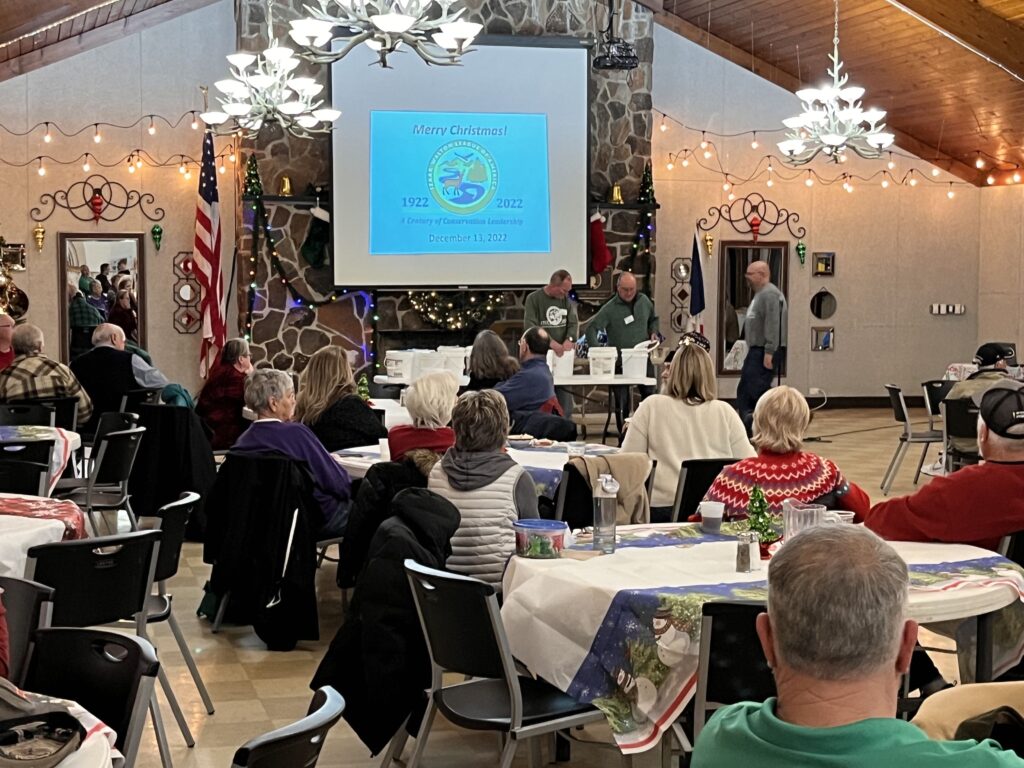
Des Moines Chapter Fun Christmas Party, photo by: Christine Curry
Vintage SOS Certificates…
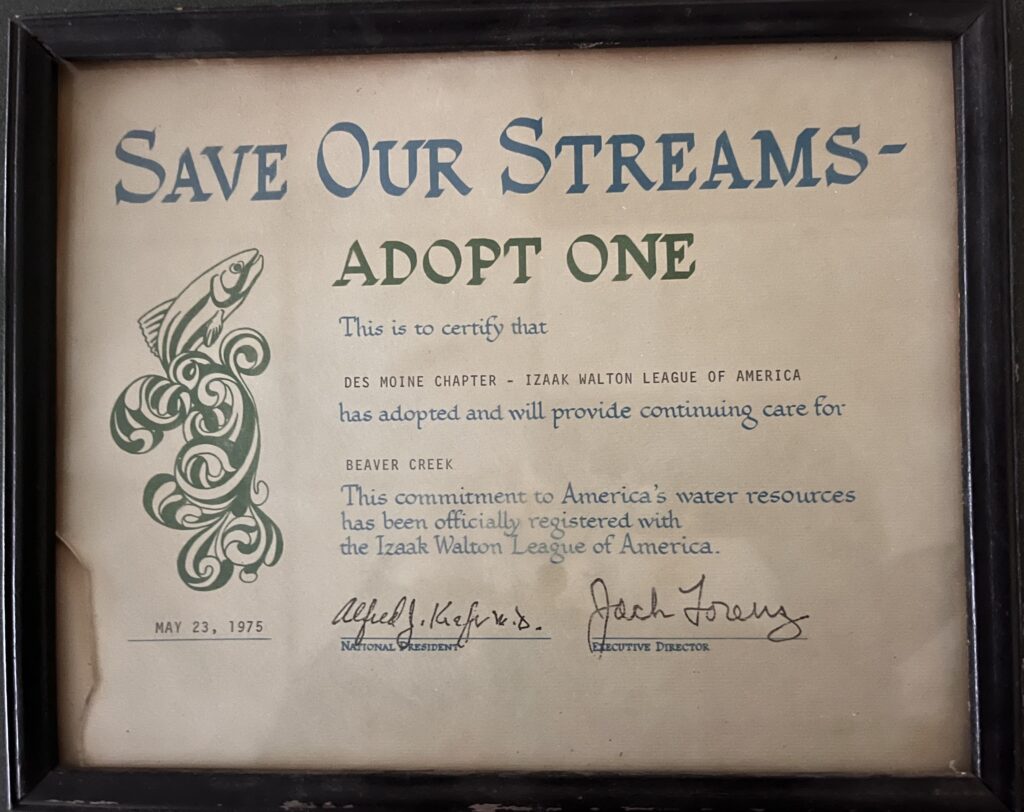
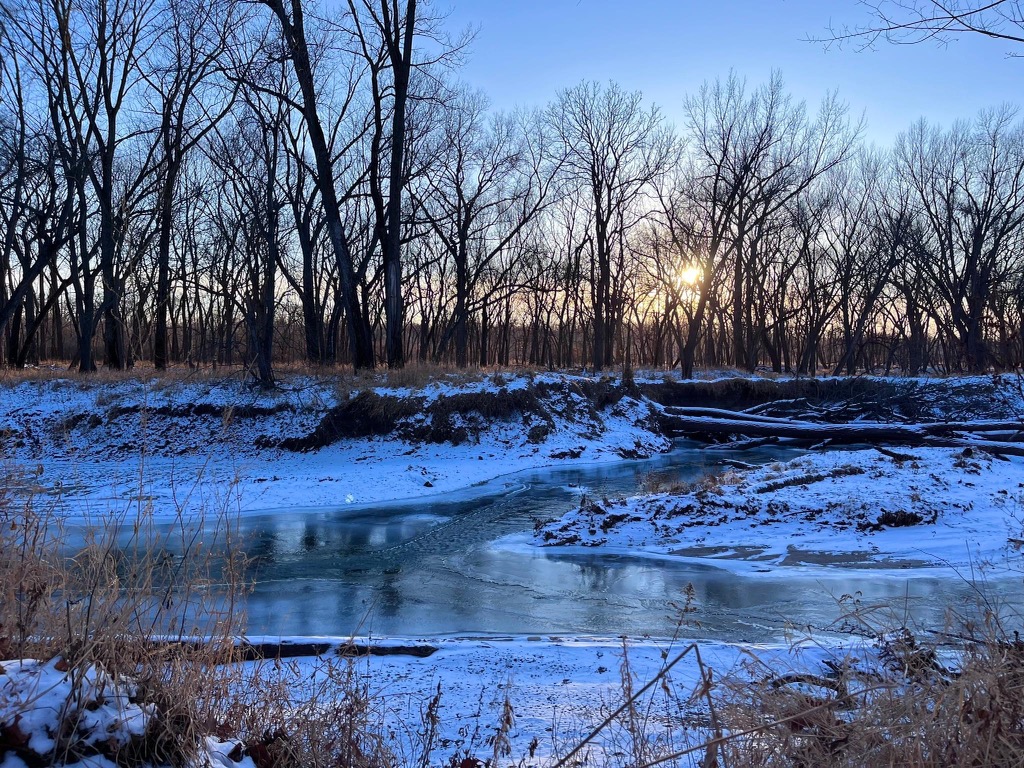
Walnut Creek in December 2022 Photo by: Robin Fortney
2022 Thinking Like a Watershed programs—
UMRI’s “Thinking Like a Watershed” series has gone fishin’!
Not wishing to compete with long summer days – and who would want to! – we hosted our final 2022 “Thinking Like a Watershed” episode on June 7th. Go outside! We will see you in January for stories to inspire a winter’s night, as told by ourselves and good partners on this road to a better landscape.
The linked recording of the June 7th presentation – by the head of a 7th generation farm creatively grappling with urban sprawl – is below, as are links to all past programs. Take a listen, take some hope, and let us know if you would like us to consider a certain someone or topic in programs to come. And if you are new to the series, we use these words to describe what shapes it: This monthly series is a project of the Upper Mississippi River Initiative (UMRI) of the Izaak Walton League of America, with co-hosts Chris Henning of the Panora Conservation Chapter and Des Moines Chapter Communication Director, Bud Hartley. We feature guests for 30-40 minute presentations that shed daylight on good works done in the name of the Mississippi and its uplands. In this way we uplift our shared goals for a cleaner river, a cared for environment, and kinder communities. Recorded programs are available shortly after they air live.
“Your Locally Grown Alternative (Farm!)” with a conversation with LaVon Griffieon on, “How the seventh generation of a century farm family takes on urbanization, food security, and soil and livestock health.”
Farmstead matriarch, LaVon shares her story about how they have created special niche markets on their 7th generation family farm. She weighs in on the good, the bad and the ups, and the downs of keeping their family farm relevant as rural landscapes around them continue to turn into suburban developments. During this transformation, hundreds of acres of our agriculture’s best top soil disappears, as does the rural land that has potential to grow real food in Iowa and reduce 90% of imported foods..
To learn more about the Griffieon’s farm click here!
If you’re interested in learning more about the Power of Data, you’ll want to watch the recording of our May 3rd Thinking Like a Watershed program: “Stream TEAM Science is (slowly) shifting policy”— a conversation with leaders Larry Dolphin, Bill Buckley, Mark Owens, lifelong members of the Izaak Walton League (IWLA), and Josh Balk, Iowa Department of Natural Resources (DNR) on How E. coli and DNA data changed Mower Co. septic system practices. This is a perfect example of how citizens’ science water monitoring with a purpose has worked to build relationships and positive change to improve water quality in a watershed filled with concentrated animal feeding operations and people.
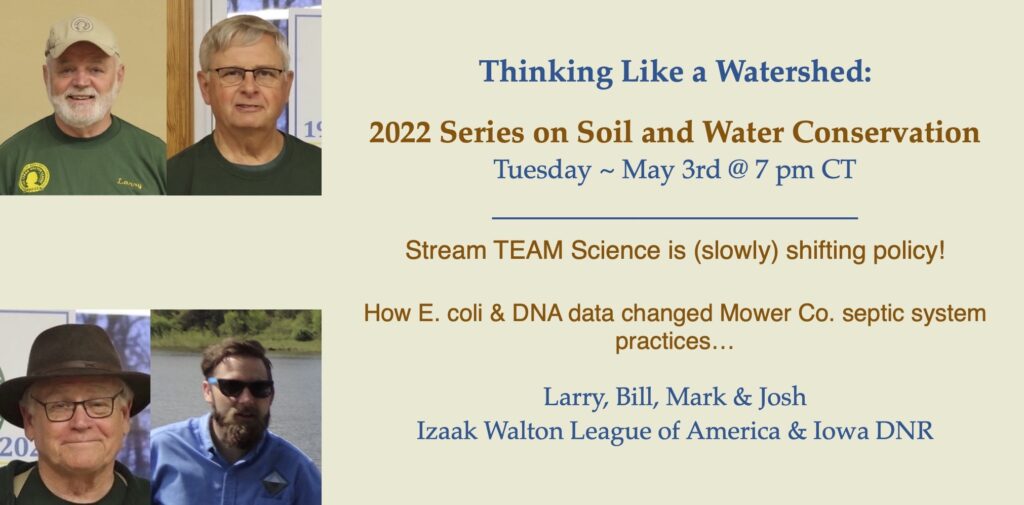
If you missed our April presentation, here is the link: The 2023 Farm Bill after 100 Years of Conservation! with Duane Hovorka, Agriculture Program Director, Izaak Walton League of America
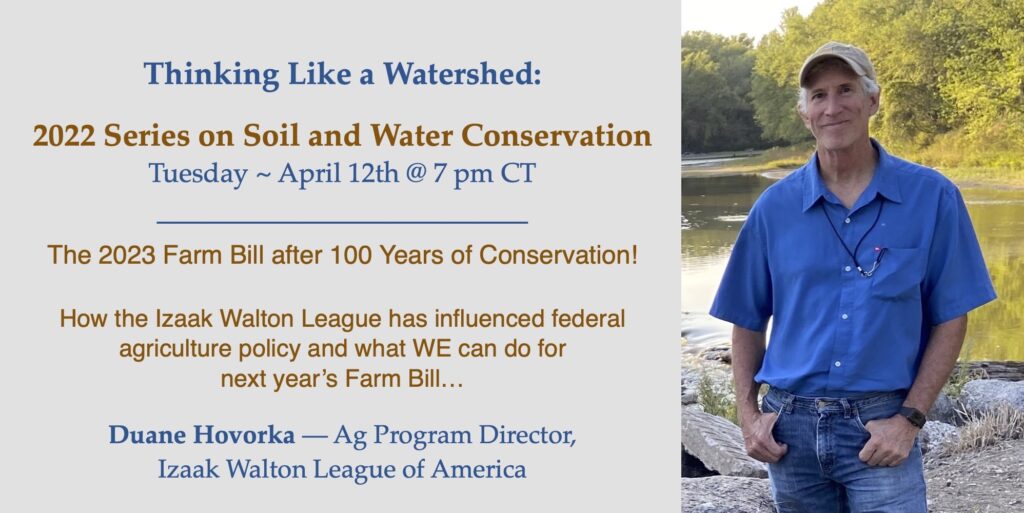
The League played an instrumental role in “groundbreaking environmental victories” during the past 100 years. Duane highlights some of those accomplishments, such as the creation of the Soil Bank in 1956, the Clean Water Act in 1972, the Conservation Reserve Program in 1985, and the Conservation Stewardship Program in 2002.
Duane summarized the 2023 Farm Bill suggestions he’s heard during winter listening sessions. He shares some of the best ideas that others have been sharing to help the Izaak Walton League prioritize solutions.
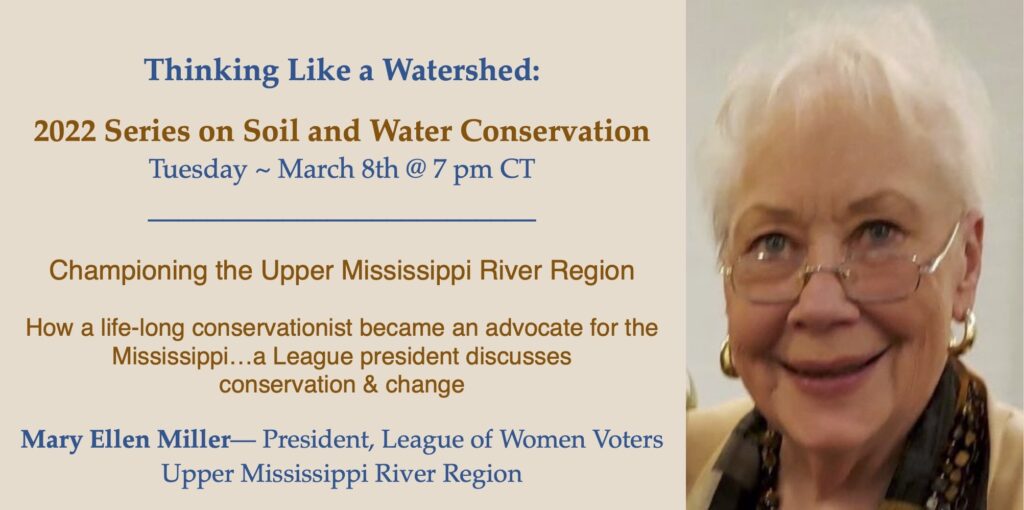
— “Championing the Upper Mississippi River Region” Thinking Like a Watershed ~ Mary Ellen Miller— March 8th, 2022 How a life-long conservationist became an advocate for the Mississippi…a League president discusses conservation & change with Mary Ellen Miller, President, League of Women Voters Upper Mississippi River Region
Our February program featured Kelly McGinnis the executive director of the Mississippi River Network which includes 58 organizations including the Izaak Walton League and several of our UMRI partners.
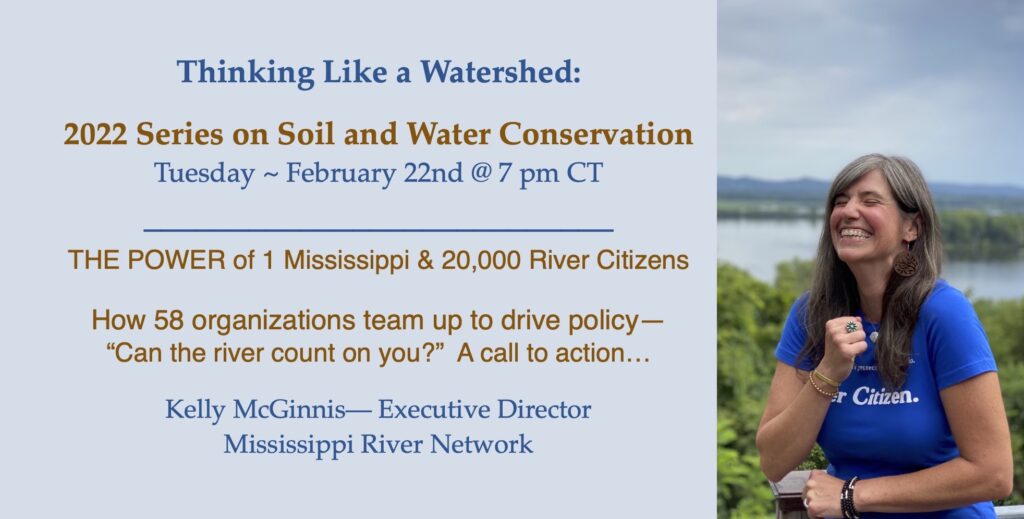
—“The POWER of 1 Mississippi & 20,000 River Citizens” Thinking Like a Watershed ~ Kelly McGinnis— February 22nd, 2022 How 58 organizations team up to drive policy—“Can the river count on you?” A call to action…
Kelly shared the power of the Mississippi River Network’s (MRN) use of public outreach and policy advocacy such as the Mississippi River Restoration and Resilience Initiative Act. You’ll find out about the activities of the network, a coalition of 58 organizations dedicated to creating a healthier Mississippi River by working for the well-being of the people, land, water, and wildlife of America’s largest watershed.
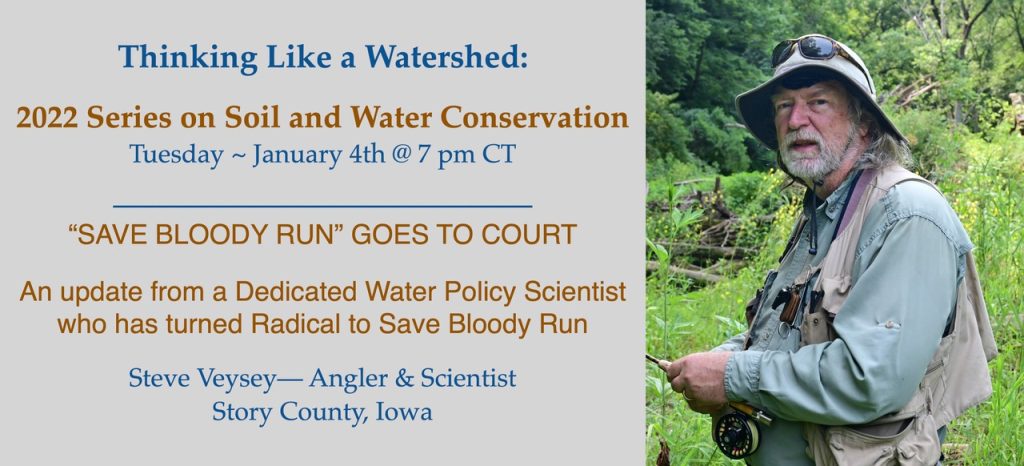
Photo by: David Thoreson
Our January program was kicked off with an update from Save Bloody Run. Where we learned the latest details from water policy scientist, Steve Veysey.“Save Bloody Run Goes to Court” Thinking Like a Watershed ~ Steve Veysey— January 4th, 2022 An update from a Dedicated Water Policy Scientist who has turned Radical to Save Bloody Run.
2021 Thinking Like a Watershed Programs—
— “Heartland Heroines” Thinking Like a Watershed ~ Robin Moore & Denise O’Brien— June 1, 2021 How two savvy conservationists empower working farm landowners to put their inner land ethic to work.
— “Planting Seeds to Grow Vibrant Communities” Thinking Like a Watershed ~ Chris Deal & Art Cullen— May 4, 2021 How Jefferson, Iowa’s Chris Deal is working with California Rep. Ro Khanna and others to grow vibrant rural communities in the Heartland with perspectives from Pulitzer Prize—winning journalist and editor of The Storm Lake Times, Art Cullen.
—“Watershed Bridges— Green to Blue”: Thinking Like a Watershed ~ Vicki Nichols Goldstein & Seth Watkins— April 6, 2021 How improving soil health and water quality in Iowa and other inland states benefit watersheds that provide critical services from land to sea.
— “Local Heroes in Howard County”: Thinking Like a Watershed ~ Neil Shaffer & Hunter Slifka— March 2, 2021 How they have incorporated several thousand acres of land under conservation programs–the largest percentage in Iowa.
—“The Accidental Conservationist”: Thinking Like a Watershed ~ Wayne Fredericks— February 2, 2021 How an Iowa Farmer is Improving Natural Capital while Increasing Profits with Conservationist and Farmer, Wayne Fredericks from Mitchell County, Iowa.
Learn more—
Izaak Walton League provides a fun educational outdoor activity for the entire family…
Learn more here!
To help celebrate the Izaak Walton Leagues’ 100th anniversary in 2022, The Des Moines Chapter is heading up an effort to expand the Izaak Walton League’s SOS (Save our Streams) program throughout Iowa. This is the only nationwide program training volunteers to protect waterways from pollution and to bring information about water quality to their communities.
The IWL’s history: At the turn of the 20th century, uncontrolled discharges of industrial waste and raw sewage, unrestricted logging, and soil erosion threatened to destroy the nation’s most productive waterways. The country’s forests, wetlands, and wilderness areas were quickly disappearing. In 1922, 54 sportsmen declared that it was “time to call a halt” to this destruction. Aware that action – not just talk – would be necessary to solve these problems, the group decided to form an organization to combat water pollution and protect the country’s woods and wildlife. As a reminder of their purpose, they named the organization after Izaak Walton, the 17th-century English angler-conservationist who wrote the literary classic The Compleat Angler.
“Defenders of Soil, Air, Woods, Waters & Wildlife”
Continue to Stay Safe and Stay Engaged…
Save our Streams—On-line training to become a certified Izaak Walton League’s Save Our Stream monitor
Click Here to learn more about Save Bloody Run
— Izaak Walton League’s Outdoor America articles on line.
—About water quality monitoring and research, check out The University of Iowa’s Chris Jones blog who has published several articles on where Iowa stands with regards to soil health and water quality.
—Wait no longer to watch, re-watch and share PFI’s full-length film, “Livestock on the Land“. Please help us get this to as many viewers as possible – farmers, eaters, citizens and policymakers.
—Iowa Farmers Union Events, check out their amazing weekly webinars…
—Iowa Environmental Council’s Event page is packed with fabulous opportunities to learn more from their organization and others.

